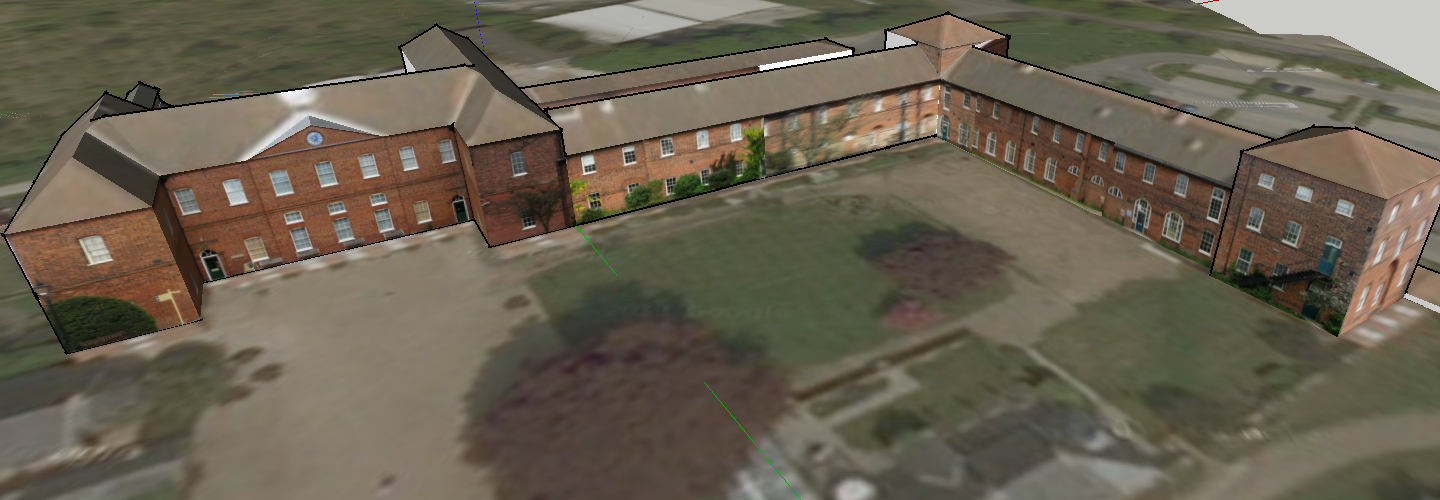Final Results
Digital Humanities Redux: Playable 3D Historical Models
Advisor: Jeff Ondich
Background
Cast your mind back to the distant past (May 2016, to be specific), when this comps topic description was offered to the CS class of 2017:
For the past several years, Carleton historian Susannah Ottaway has been studying British workhouses from the 18th and 19th centuries. (Think "the place Oliver Twist worked.") As part of her research and teaching on the topic, Professor Ottaway has recently begun working with historian and digital humanities expert Austin Mason to apply digital tools to historical research and pedagogy.
In the Winter 2016 course HIST235 Bringing the English Past to (Virtual) Life, Professors Ottaway and Mason and their students experimented with a variety of digital techniques, one of which was the creation of a 3D model of the Gressenhall workhouse in Norfolk, UK. They used this model to let people do simple walks through the space to get a sense of space and scale from the interior of the buildings.

So far, so good. But Professors Ottaway and Mason are looking for more. For example, they would like to be able to create both computer-controlled and human-controlled characters to live in the space. They would like to be able to create rules of behavior for computer-controlled characters in hopes of running simulations to model daily life in the workhouse to see which models correspond well to known facts. They would like a convenient way to create quests (go spin some wool, serve gruel to all the workers, find the master,...) to help illustrate aspects of workhouse life. They would like to be able to attach annotations to elements in the 3D model (click on that tapestry over there to get links to research articles about it). And of course, they would like all of these techniques to be extensible to 3D models of places other than Gressenhall.
The central goal for this CS comps project will be to make 3D models like the Gressenhall model "playable"—both for human players and for fully automatic simulations. Playability will have many benefits, but the heart of the matter was expressed very nicely by one participant [Professor Louis Epstein] at a recent Day of Digital Humanities symposium held at Carleton. His project's goals were numerous, but he spoke particularly about using digital tools to "enliven students' historical imagination."
Last year's Digital Humanities CS Comps team created Prairie, a set of tools that add playability to historical models, and some non-coder-usability to the sophisticated game engine Unity. Among other things, Prairie includes:
- code and a code architecture supporting creation of common interactions with 3D models (e.g. opening doors, rotating objects in your hand, turning on the lights, etc.)
- a system for creating stories and importing them into Unity
- much simpler user interfaces than Unity's default UIs for editing 3D model attributes
- a system for annotating locations and objects with historical information (e.g. you might click on an archway to get access to primary and secondary documents about that archway, photographs of the original, a video discussion of 18th century construction techniques, etc.)
- extensive reference and tutorial documentation
Last year's project was successful enough that Professors Ottaway and Mason want to take it further.
The Project
This project will involve:
- Talking with Professors Ottaway and Mason and possibly other historians, archaeologists, etc. to learn more about their goals
- Improving the integration of stories into the Unity development platform, making it easier for non-coders to create and edit their stories
- Adding non-player characters, with conversational interactions
- Making it possible to create more sophisticated stories by adding some sort of memory to the story script (e.g. allowing the player to pick up and hang onto objects that might be useful later, or making a conversation with a character happen only after some other event has occurred)
- Continuing the original Prairie team's focus on usability, enhanced by user testing (with both historian-writing-stories types of users and players-playing-historical-games types of users)
- Continuing the original Prairie team's focus on keeping the system relevant for history education
- Continuing the original Prairie team's habit of creating high-quality reference and tutorial documentation as each new feature is added to the system
- etc.
Prerequisites
This project has no formal prerequisites, beyond being a compsing CS major. If you want to be on this project and have not yet taken Software Design, I urge you to register for it in the fall.